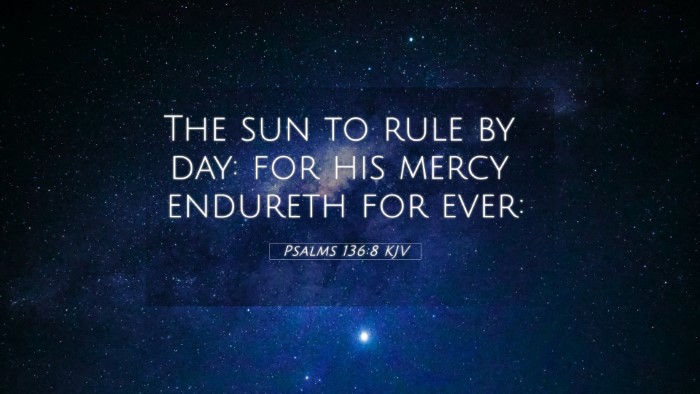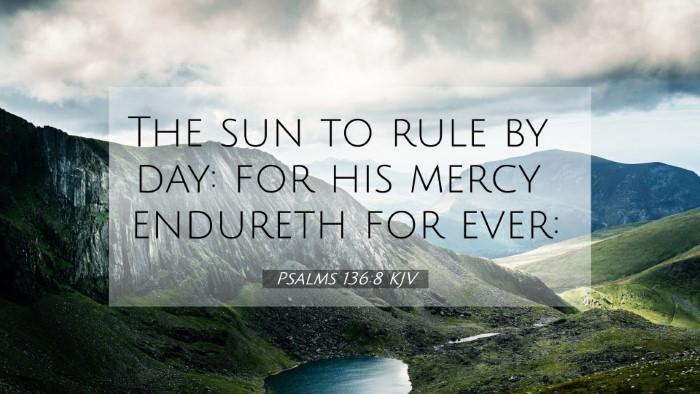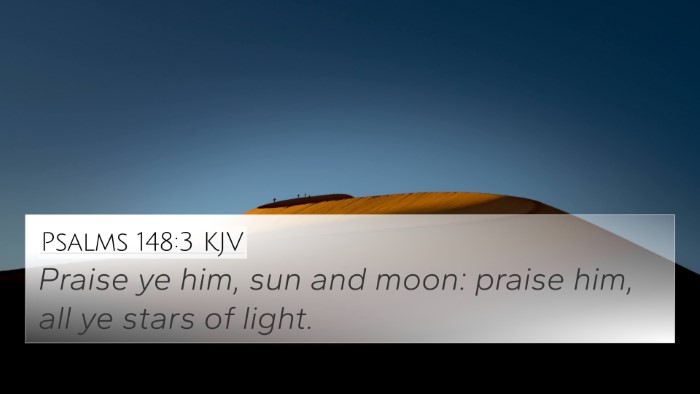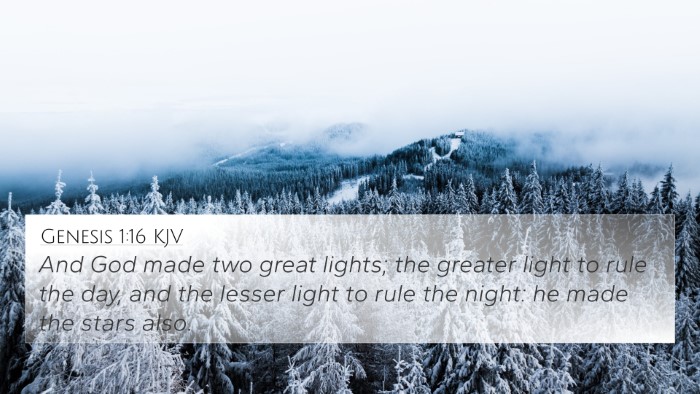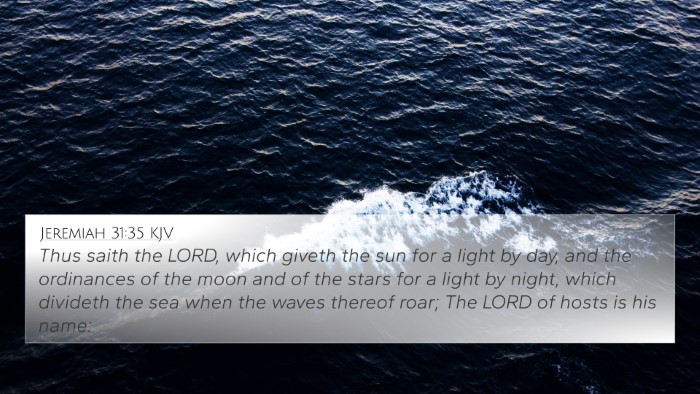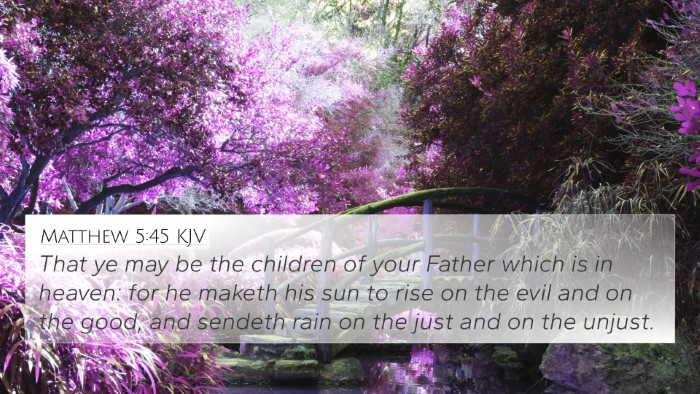Psalms 136:8 - A Deeper Understanding
Psalms 136:8 reads, "The sun to rule by day; for his mercy endureth forever." This verse reflects the grand theme of God’s enduring love and mercy, demonstrated through the natural order and the sustaining of creation.
Meaning and Interpretation
The verse captures a two-fold aspect of divine provision — the creation of the sun and the continued mercy of God. This reflects not only the beauty of God’s creation but also His commitment to humanity through His mercy.
Matthew Henry emphasizes the importance of God's creative power and the reassurance it provides us of His ongoing care. He suggests that the “sun” serves as a consistent reminder of God’s presence and the light He brings into our lives.
Albert Barnes points out that the phrase “for his mercy endureth forever” is a refrain that emphasizes the eternal aspect of God's kindness towards His creation. He argues that the enduring nature of God’s mercy is foundational for believers, encouraging them to trust in God's everlasting support.
Adam Clarke elaborates by noting that the sun symbolizes victory over darkness, aligning with the biblical motif of light representing goodness and truth. Clarke connects this with the idea that God’s mercy dispels the darkness of sin and despair in human hearts.
Connections Between Bible Verses
Understanding the cross-references for Psalms 136:8 enriches its meaning:
- Genesis 1:16 - "And God made two great lights; the greater light to rule the day, and the lesser light to rule the night." This verse highlights God's role as the Creator of the sun and moon, similar to the themes in Psalms 136.
- Isaiah 60:19 - "The sun shall be no more thy light by day; neither for brightness shall the moon give light unto thee: but the Lord shall be unto thee an everlasting light." This verse connects the concept of God's everlasting light with His mercy.
- Psalm 84:11 - "For the Lord God is a sun and shield: the Lord will give grace and glory: no good thing will he withhold from them that walk uprightly." This verse parallels God's provision and protection as seen in Psalms 136:8.
- 2 Corinthians 4:6 - "For God, who commanded the light to shine out of darkness, hath shined in our hearts, to give the light of the knowledge of the glory of God in the face of Jesus Christ." Here, the connection to light reflects spiritual enlightenment through God's mercy.
- John 8:12 - "Then spake Jesus again unto them, saying, I am the light of the world: he that followeth me shall not walk in darkness, but shall have the light of life." Jesus being the Light ties back to the imagery of the sun enlightening the day, reminiscent of Psalms 136.
- Lamentations 3:22-23 - "It is of the Lord's mercies that we are not consumed, because His compassions fail not. They are new every morning: great is thy faithfulness." This emphasizes God’s enduring mercy in both the Old and New Testaments, affirming the continual theme found in Psalms 136:8.
- Hebrews 13:5 - "For he hath said, I will never leave thee, nor forsake thee." This illustrates the promise of God's perpetual presence and mercy similar to the sun's consistent role in our day-to-day lives.
Thematic Bible Verse Connections
This chapter of Psalms is often referred to as the "Great Hymn of Praise," capturing the essence of God's love and mercy. By contemplating the themes found in Psalms 136:8, we can discover core biblical principles:
- Creation and Worship: The fostering of a worshipful attitude toward God's creation, acknowledging His sovereignty in establishing the universe.
- The Nature of God’s Mercy: A reassurance that God's mercy is constant and unchanging, providing hope and strength to believers.
- Light vs. Darkness: The ongoing battle between light (goodness and God's presence) and darkness (sin and despair) is a key theme in scripture.
- Trust in God: Trusting in God's enduring mercy and presence in our lives provides believers a firm foundation in their faith journey.
Cross-Referencing Biblical Texts
Psalms 136:8 not only serves as an anchor in the Book of Psalms but also resonates throughout various scripture, forming a rich fabric of inter-Biblical dialogue. It invites believers to engage in a deeper study of God's word using tools for Bible cross-referencing:
- Bible Concordance: Leverage a Bible concordance to locate similar themes and concepts across different books.
- Bible Cross-Reference Guide: Utilize guides that help connect themes of mercy and creation across both Old and New Testaments.
- Cross-Reference Bible Study: Engage in cross-referencing methods to understand how different scriptures reflect the character of God.
- Bible Chain References: Create a chain reference study noting the interconnectedness of God’s work throughout scripture.
How to Use Bible Cross-References
Understanding how to find cross-references in the Bible can significantly enrich your spiritual study:
- Identify Key Terms: Note the key terms and themes in Psalms 136:8, such as 'mercy', 'light', and 'day'.
- Search Related Verses: Use a Bible study tool, like a concordance, to find verses that discuss these themes.
- Look for Patterns: Observe recurring phrases or themes in scripture that relate to God’s mercy and creation.
- Make Comparative Analyses: Compare verses side-by-side to draw conclusions about how they support or expand upon each other.
Conclusion: Embracing God's Mercy
Psalms 136:8 serves as a poignant reminder of the light and mercy that God provides continually. This verse, when cross-referenced with related Biblical texts, opens a fruitful study of God's character and His plan for humanity. Through it, we learn the importance of recognizing God's enduring mercy in our lives and the world around us.

